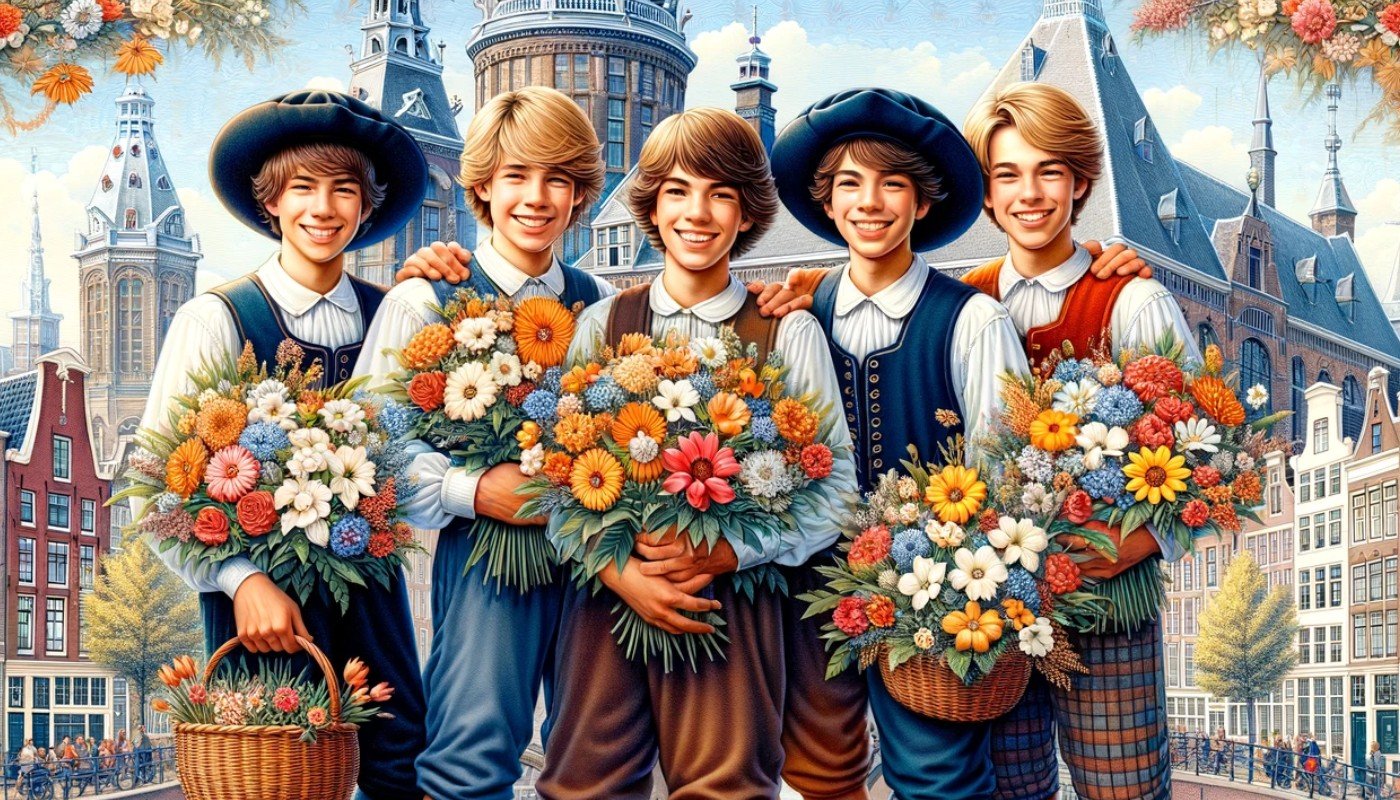Welcome to our comprehensive exploration of Dutch male names, where we delve into the rich tapestry of the Netherlands’ naming traditions. In this blog post, we present to you an extensive list of the top 1200 Dutch boy names, each with its unique history, meaning, and cultural significance. Whether you’re seeking a name that honors ancestral roots, carries a particular linguistic charm, or simply looking for inspiration for your little one, our carefully curated selection is designed to guide you through the diverse landscape of Dutch names. From classic to contemporary, and from the highly popular to the distinctly rare, you’re sure to find the perfect name that resonates with your family’s heritage and personal taste. Join us on this linguistic journey as we explore the beauty and variety of Dutch names for boys.
A

- Aart: A Dutch variant of the name Arthur, meaning “noble” or “brave.”
- Abel: A name of Hebrew origin, meaning “breath” or “vanity,” known from the biblical story of Cain and Abel.
- Abraham: A name of Hebrew origin meaning “father of many,” also known from the biblical patriarch.
- Adriaan: The Dutch form of Adrian, from the Latin Hadrianus, meaning “from Hadria” in Italy.
- Arie: A Dutch diminutive of Adrianus or Arij, meaning “eagle” or “strong.”
- Arjen: A Frisian name, possibly a variation of Adrian, meaning “from Hadria.”
- Arno: Derived from Arnold, meaning “eagle power.”
- Arnold: Of Germanic origin, meaning “ruler” or “powerful as an eagle.”
- Arthur: A name of Celtic origin, possibly meaning “bear” or “noble.”
- Axel: A Scandinavian form of the biblical name Absalom, which means “father of peace.”
- Aloysius: A Latinized form of the name Aloys, possibly derived from Ludwig, meaning “famous warrior.”
- Alex: Short for Alexander, meaning “defender of the people.”
- Alexander: Of Greek origin, meaning “defender of the people” or “defender of men.”
- Andries: A Dutch form of Andreas, the Greek name meaning “manly” or “brave.”
- Anton: Derived from the Roman family name Antonius, the meaning of which is uncertain but could be “priceless.”
- Antonie: A Dutch variant of Anthony, meaning “priceless one” or “highly praiseworthy.”
- Aron: The Dutch spelling of Aaron, of Hebrew origin, meaning “mountain of strength.”
- August: From the Latin name Augustus, meaning “great” or “venerable.”
- Auke: A Frisian name, possibly a short form of Germanic names beginning with “ald” meaning “old” or “noble.”
- Albert: Of Germanic origin, meaning “noble” and “bright.”
- Aldert: A Dutch name of Germanic origin, meaning “old” and “bright.”
- Alfons: Of Germanic origin, meaning “noble” and “ready.”
- Alwin: A Dutch variant of Alvin, possibly meaning “noble friend.”
- Aloys: A variant of Aloysius; also, a short form of names beginning with “Al-.”
- Amand: A name of Latin origin, meaning “one who is lovable” or “worthy of love.”
- Ambroos: The Dutch form of Ambrose, from the Greek “ambrosios,” meaning “immortal.”
- Ame: A short form of Germanic names beginning with the element “amal,” meaning “work.”
- Amos: Of Hebrew origin, meaning “carried by God.”
- Andor: A Dutch and Hungarian name, possibly a form of Andros, meaning “manly.”
- André: The Dutch and French form of Andrew, meaning “manly” or “brave.”
- Angelo: Of Italian origin, meaning “angel” or “messenger of God.”
- Anjo: A Dutch diminutive form of names starting with “An-.”
- Anthonie: A Dutch variant of Anthony, meaning “priceless one.”
- Antonius: The Latin form of Anthony, meaning “highly praiseworthy.”
- Arend: Of Germanic origin, meaning “eagle.”
- Arent: A variant of Arend, also meaning “eagle.”
- Arie-Jan: A Dutch compound name combining Arie and Jan, with Arie meaning “eagle” and Jan meaning “God is gracious.”
- Aris: A short form of Aristides or other names beginning with “Ari-,” meaning “best.”
- Armand: French and Dutch form of Herman, meaning “army man.”
- Arnoud: A Dutch variant of Arnold, meaning “eagle power.”
- Arnout: Another Dutch variant of Arnold, with the same meaning as Arnoud.
- Arvid: Of Old Norse origin, meaning “eagle tree” or “forest of eagles.”
- Asbjørn: A Scandinavian name, from the Old Norse elements “ás,” meaning “god,” and “bjǫrn,” meaning “bear.”
- Asher: Of Hebrew origin, meaning “happy” or “blessed.”
- Augustijn: A Dutch form of Augustine, meaning “great” or “venerable.”
- Augustinus: The Latin form of Augustus, meaning “venerable” or “consecrated.”
- Auke-Pieter: A Dutch compound name; Auke means “noble,” and Pieter means “rock” or “stone.”
- Aaldert: A Dutch name, possibly a variant of Aldert, meaning “old” and “bright.”
- Aalderik: A Dutch name, possibly a variant of Alderik, meaning “noble ruler.”
- Aalt: A short form of names beginning with “Adal,” meaning “noble.”
B
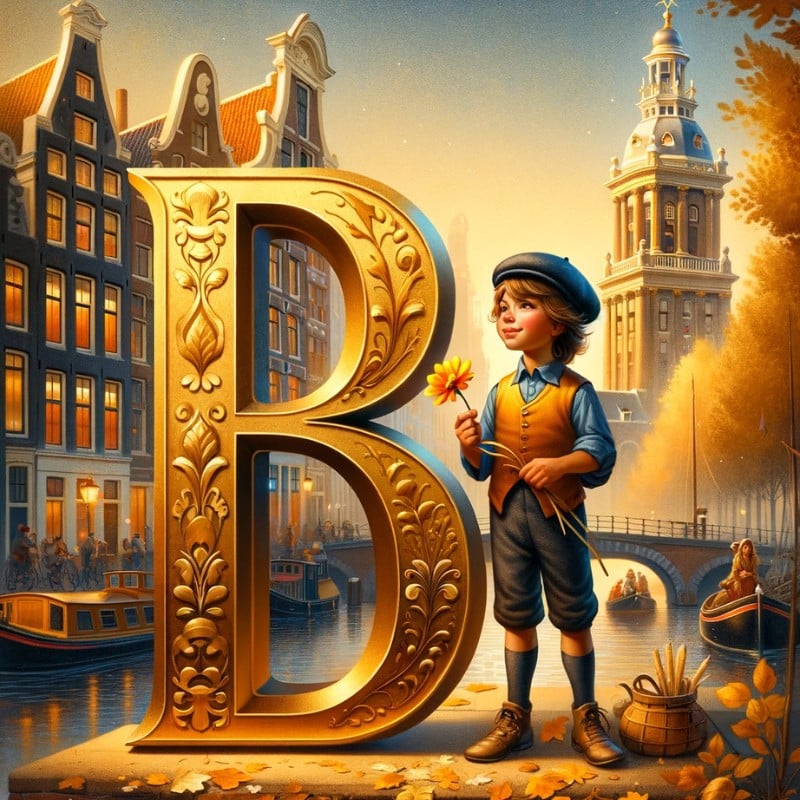
- Bas: A short form of Sebastian, meaning “venerable” or “revered.”
- Bram: Often a diminutive of Abraham, meaning “father of many” in Hebrew.
- Bart: A diminutive of Bartholomew, which comes from the Aramaic meaning “son of Talmai.”
- Boris: A name of Slavic origin meaning “fight” or “fighter.”
- Boaz: A Hebrew name found in the Bible meaning “swiftness.”
- Ben: Typically a short form of Benjamin, meaning “son of the right hand” in Hebrew.
- Berend: A Dutch variant of Bernard, meaning “brave as a bear.”
- Bernard: A name of Germanic origin meaning “bear brave” or “strong bear.”
- Bjorn: A name of Scandinavian origin meaning “bear.”
- Bob: Often a diminutive of Robert, meaning “bright fame.”
- Boudewijn: A Dutch form of Baldwin, meaning “bold friend.”
- Boy: A name that is used in the Netherlands, often as a short form for names like Boyan.
- Brian: A name of Celtic origin meaning “high” or “noble.”
- Bruno: A name of Germanic origin meaning “brown.”
- Bastiaan: A Dutch variant of Sebastian, meaning “venerable” or “revered.”
- Benjamin: A Hebrew name meaning “son of the right hand.”
- Bertram: A name of Germanic origin meaning “bright raven.”
- Bink: A unique Dutch name, possibly a diminutive of Benedict, meaning “blessed.”
- Bjarne: A Scandinavian name derived from Bjorn, meaning “bear.”
- Boet: A Dutch name, possibly a variant of the name Boetius, which is of unknown meaning.
- Bonne: A Frisian name possibly derived from the Old Frisian word for “good.”
- Boye: A Frisian and Dutch name, which could be a variant of Boy or a diminutive of names like Boij or Boi.
- Brent: An English name meaning “steep hill,” used in the Netherlands as well.
- Bret: An English name, derived from a surname meaning “Briton” or “from Britain,” used in the Netherlands.
- Broos: A Dutch name of uncertain meaning, possibly related to the word “broos,” meaning “fragile.”
- Bryan: A variant of Brian, meaning “high” or “noble.”
- Barend: A Dutch name meaning “bear” or “warrior.”
- Bartholomeus: A Dutch form of Bartholomew, meaning “son of Talmai.”
- Batuhan: A Turkish name meaning “firm,” “hard,” or “strong,” used in the Netherlands as well.
- Bauke: A Frisian name, possibly a diminutive of names beginning with “Badu-” meaning “fight.”
- Beert: A Dutch and Frisian name possibly derived from names containing the element “berht” meaning “bright.”
- Benito: A Spanish or Italian diminutive of Benedict, meaning “blessed,” used in the Netherlands.
- Bennie: A diminutive of Benjamin, meaning “son of the right hand,” or of Benedict, meaning “blessed.”
- Bent: A Danish and Dutch short form of Benedict, meaning “blessed.”
- Berat: A Turkish name meaning “heavy” or “weighty,” used in the Netherlands as well.
- Berend-Jan: A Dutch compound name combining Berend and Jan, which means “brave as a bear” and “God is gracious,” respectively.
- Bernardus: A Latinized form of Bernard, meaning “bear brave” or “strong as a bear.”
- Bert: A short form of names beginning with “Bert-“, such as Albert or Bertram, meaning “bright.”
- Bertus: A Dutch diminutive of Berthold or Albert, meaning “bright ruler” or “noble bright,” respectively.
- Bessel: A Dutch name, possibly a diminutive of Besselaar, which is of uncertain meaning.
- Bille: A Dutch name of uncertain origin, possibly related to the Germanic element “bil,” meaning “sword.”
- Binck: A Dutch name, which may be a variant of Bink or a diminutive of Benedict.
- Bing: A Germanic name meaning “kettle-shaped hollow,” used in the Netherlands.
- Birger: A Scandinavian name meaning “rescue,” “save,” “help,” used in the Netherlands.
- Blaine: A Scottish name meaning “yellow,” used in the Netherlands.
- Bobbie: A diminutive of Robert, meaning “bright fame,” used in the Netherlands.
- Bodhi: A name of Sanskrit origin meaning “awakening,” “enlightenment,” used in the Netherlands.
- Boele: A Frisian name, which may be a diminutive of names containing the element “bold” or “bald,” meaning “bold” or “brave.”
C
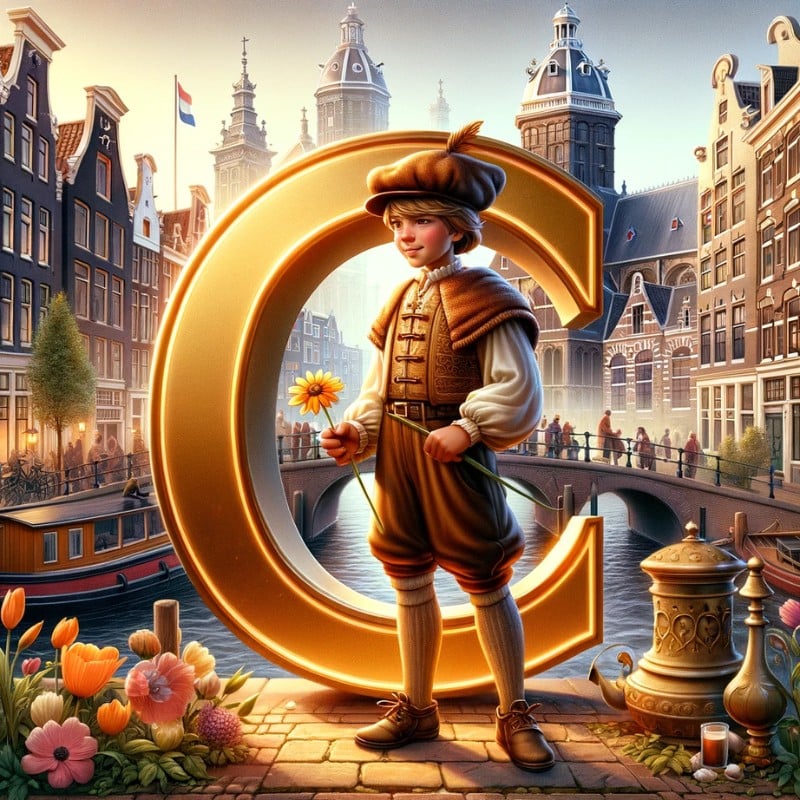
- Casper: A Dutch variant of Jasper, meaning “treasurer” or “bearer of treasure.”
- Cees: A Dutch diminutive of Cornelis, meaning “horn.”
- Coen: Short for Coenraad, the Dutch form of Conrad, meaning “bold counsel.”
- Cornelis: Of Latin origin, meaning “horn,” possibly referring to strength or abundance.
- Christiaan: The Dutch form of Christian, meaning “follower of Christ.”
- Carel: A Dutch variant of Charles, meaning “free man.”
- Cyril: From the Greek name Kyrillos, meaning “lordly” or “masterful.”
- Cai: A name of uncertain origin, possibly a variant of Kai, which can mean “warrior” or “sea” in different cultures.
- Camiel: The Dutch form of Camillus, a Roman family name possibly meaning “attendant at a religious service.”
- Cedric: Although not traditionally Dutch, it is used in the Netherlands and means “bounty” or “kindly and loved.”
- Cees: A Dutch short form of Cornelius, again meaning “horn.”
- Cem: A Turkish name meaning “ruler” or “leader,” also used in the Dutch multicultural society.
- Chiel: A Dutch diminutive of Michiel, the Dutch form of Michael, meaning “who is like God?”
- Christoffel: A Dutch form of Christopher, meaning “bearing Christ.”
- Clemens: Of Latin origin, meaning “merciful” or “gentle.”
- Cliff: Short for Clifford or Clifton, and though English in origin, it is used in the Netherlands, meaning “cliff settlement.”
- Coert: A Dutch short form of the name Coenraad, meaning “bold counsel.”
- Colin: With Gaelic origins meaning “young creature” or “pup,” it is also used in Dutch-speaking countries.
- Constantijn: The Dutch form of Constantine, meaning “constant” or “steadfast.”
- Cor: A short form of Cornelius, meaning “horn” in Dutch.
- Corné: Another diminutive of Cornelis, with the same meaning as Cornelis.
- Corwin: An English name meaning “heart’s friend” or “hill,” used in Dutch as well.
- Crijn: A Dutch name, possibly a diminutive of Cornelis or a variant of Quirijn.
- Crispijn: The Dutch form of Crispin, meaning “curly-haired.”
- Cristian: A variant of Christiaan, meaning “follower of Christ.”
- Cyrano: A name of French origin, popularized by the play ‘Cyrano de Bergerac,’ and used in Dutch-speaking regions.
- Cas: A short and modern Dutch form of Casper or other names beginning with Cas-.
- Casper-Jan: A Dutch compound name combining Casper and Jan, with Casper meaning “treasurer” and Jan meaning “God is gracious.”
- Catharinus: A male form of Catharina, meaning “pure,” used in historical contexts.
- Cato: A Roman family name meaning “wise,” also used in the Netherlands.
- Cees-Jan: Another Dutch compound name, combining Cees (a form of Cornelis) and Jan.
- Celestijn: A name of Latin origin meaning “heavenly” or “of the sky.”
- Cesar: The Dutch form of Caesar, meaning “long-haired” or “emperor.”
- Chaim: A name of Hebrew origin meaning “life,” used in Jewish communities in the Netherlands.
- Chan: A name of Chinese origin meaning “zen,” adopted in various cultures, including the Dutch.
- Charles: An English and French name meaning “free man,” used in the Netherlands due to its international nature.
- Charly: A diminutive form of Charles, with the same meaning as Charles.
- Chay: A modern name of uncertain origin, used in Dutch-speaking regions.
- Chen: A name of Chinese origin meaning “dawn,” used in the Netherlands.
- Chester: An English name meaning “fortress” or “walled town,” occasionally found in Dutch-speaking countries.
- Chet: A diminutive of Chester, with the same meaning as Chester.
- Chevalier: A French name meaning “knight,” used in the Netherlands, especially in families with French connections.
- Chiel-Jan: A Dutch compound name, combining Chiel (a form of Michiel) and Jan.
- Chinook: A name derived from the Native American Chinook people, used sporadically in the Netherlands.
- Chris: A short form of Christiaan or Christopher, meaning “follower of Christ” or “bearing Christ.”
- Christo: A short form of Christoffel or Christiaan, with the same religious meaning.
- Christoff: A variant of Christoffel, meaning “bearing Christ.”
- Chuck: An English nickname for Charles, meaning “free man,” and used in the Netherlands.
- Claas: A Dutch form of Nicholas, meaning “victory of the people.”
- Clarence: An English name meaning “clear” or “bright,” occasionally found in Dutch-speaking regions.
- Claudio: Of Latin origin, meaning “lame” or “enclosure,” and used in the Netherlands.
- Clay: An English name meaning “clay worker,” used in Dutch-speaking regions.
D

- Daan: A short form of Daniël, the Dutch variant of Daniel, meaning “God is my judge.”
- Diederik: A Dutch form of the name Theodoric, meaning “ruler of the people.”
- Dirk: A shortened form of Diederik, meaning “ruler of the people.”
- Dennis: The Dutch form of Dionysius, referring to the Greek god of wine and revelry.
- Davy: A variant of David, meaning “beloved.”
- Dion: A name derived from Dionysus, the Greek god of wine, or short for Dionysius.
- Dieder: A shortened form of Diederik, meaning “ruler of the people.”
- Derk: Another variant of Diederik, meaning “ruler of the people.”
- Duco: A Frisian name, possibly derived from the Germanic element “dugu,” meaning “valuable” or “dear.”
- Daniël: The Dutch variant of Daniel, meaning “God is my judge.”
- Dolf: A short form of Adolf, meaning “noble wolf.”
- Dorus: A Dutch diminutive of Theodorus, meaning “gift of God.”
- Douwe: A Frisian name derived from the Germanic element “dub,” meaning “dove.”
- Dries: A short form of Andries or Andreas, meaning “manly” or “brave.”
- Daaf: A Dutch diminutive of David, meaning “beloved.”
- Duko: A variant of Duco, with the same possible Germanic element “dugu.”
- Denzel: A name of uncertain origin, possibly a variant of Denzell, a place name in Cornwall.
- Dick: A diminutive of Dirk, meaning “ruler of the people.”
- Dinant: A Dutch name, possibly related to the town of Dinant in Belgium, or a variant of the name Diederik.
- Django: A Romani name meaning “I awake,” used in the Netherlands.
- Dani: A short form of Daniël, meaning “God is my judge.”
- Dax: A name with French origins, from a town in southwestern France, used in the Netherlands.
- Detlef: A German name meaning “heritage of the people,” used in the Netherlands.
- Dimitri: A form of Demetrius, meaning “follower of Demeter,” the Greek goddess of agriculture.
- Dinand: A Dutch name that may be a variant of Diederik or a combination of names like Dirk and Berend.
- Dingeman: A Dutch name meaning “man of the court” or “judge.”
- Dionysius: The Dutch form of Dionysius, referring to the Greek god of wine.
- Dirck: A variant of Dirk, meaning “ruler of the people.”
- Dominik: A Dutch form of Dominic, meaning “of the Lord.”
- Donny: A diminutive of names like Donald, meaning “world ruler,” used in the Netherlands.
- Dorus: A Dutch diminutive of Theodorus, meaning “gift of God.”
- Douwes: A patronymic form of Douwe, meaning “son of Douwe.”
- Dre: A short form of names like Andries or Andreas, meaning “manly” or “brave.”
- Driek: A Dutch diminutive of Hendrik, meaning “home ruler.”
- Duurt: A Frisian name, possibly a variant of Duco or a form of the Germanic element “dur,” meaning “lasting.”
- Dylan: A Welsh name meaning “son of the sea,” used in the Netherlands.
- Diederick: Another variant of Diederik, meaning “ruler of the people.”
- Diederic: A spelling variant of Diederik, with the same meaning.
- Dietmar: A German name meaning “famous people,” used in the Netherlands.
- Dieter: A German name meaning “army of the people,” used in the Netherlands.
- Dim: A short form of Dimitri, meaning “follower of Demeter.”
- Dionisio: A Spanish or Italian form of Dionysius, used in the Netherlands.
- Dirke: A variant of Dirk, with the same meaning.
- Don: A name of English origin meaning “ruler of the world,” used in the Netherlands.
- Dorus: A Dutch diminutive of Theodorus, meaning “gift of God.”
- Douwina: A Frisian name, possibly a feminine form of Douwe, though used for males at times.
- Dries: A short form of Andries or Andreas, meaning “manly” or “brave.”
- Duarte: A Portuguese form of Edward, meaning “wealthy guardian,” used in the Netherlands.
- Duko: A variant of Duco, with the same possible Germanic element “dugu.”
- Durk: A Frisian form of Dirk, meaning “ruler of the people.”
E
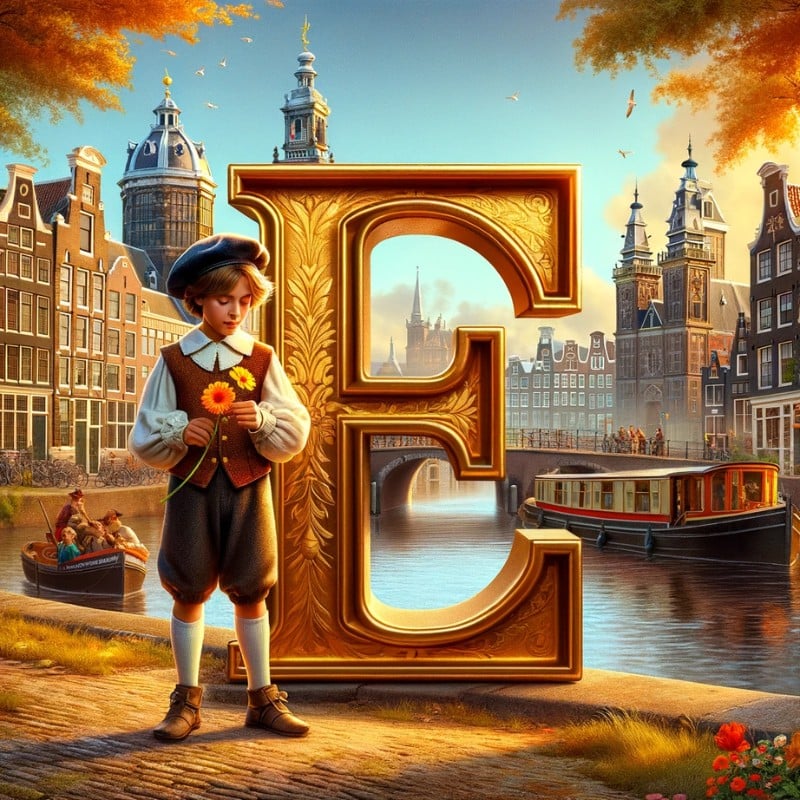
- Ebbe: A Dutch diminutive of Eberhard, meaning “strong as a boar.”
- Eddy: A diminutive of Eduard, the Dutch form of Edward, meaning “wealthy guardian.”
- Edgar: Of English origin meaning “wealthy spearman,” used in Dutch-speaking countries.
- Edmond: The Dutch form of Edmund, meaning “prosperity” and “protector.”
- Eduard: The Dutch form of Edward, meaning “wealthy guardian.”
- Eelco: A Frisian name possibly meaning “noble” and “wolf.”
- Egbert: Of Germanic origin, meaning “bright edge” or “bright sword.”
- Egon: Of German origin, possibly meaning “strong with a sword,” used in the Netherlands.
- Eike: A Frisian and Low German short form of names beginning with the Germanic element “ag,” meaning “edge” or “sword.”
- Einar: Of Old Norse origin, meaning “one warrior” or “alone, warrior,” used in Dutch-speaking countries.
- Elbert: A variant of Albert, meaning “noble” and “bright.”
- Eldert: A Dutch variant of Aldert, meaning “old” and “bright.”
- Eleazar: Of Hebrew origin, meaning “God has helped,” used in Dutch-speaking communities.
- Elger: A Dutch name possibly derived from elements meaning “noble” and “spear.”
- Eli: Of Hebrew origin, meaning “ascended” or “my God,” used in Dutch-speaking countries.
- Elias: The Greek form of Elijah, meaning “Yahweh is my God,” used in the Netherlands.
- Elmar: Of German origin, meaning “noble” and “famous.”
- Elmo: Of Italian origin, meaning “helmet” or “protection,” and used in Dutch-speaking regions.
- Elroy: An English name meaning “the king,” occasionally found in Dutch-speaking countries.
- Eltjo: A Gronings or East Frisian name, possibly a diminutive of names beginning with “adel” meaning “noble.”
- Elwin: A variant of Alwin, meaning “noble friend,” adopted in Dutch-speaking areas.
- Elzo: A name of uncertain origin, possibly related to Eltjo or a diminutive of names starting with ‘El-,’ used in the Netherlands.
- Emanuel: The Dutch form of Immanuel, meaning “God is with us.”
- Emiel: The Dutch form of Emil, meaning “rival” or “eager.”
- Emilio: Of Spanish or Italian origin, meaning “rival,” and used in Dutch-speaking countries.
- Emmerich: Of German origin, meaning “work” and “ruler,” used in the Netherlands.
- Enno: A Frisian name possibly derived from a Germanic name meaning “sword.”
- Enrico: Of Italian origin, meaning “home ruler,” used in the Netherlands.
- Enrikos: A name of Greek origin meaning “ruler of the house,” used in Dutch-speaking regions.
- Enzo: An Italian diminutive of Vincenzo or Lorenzo, meaning “winner” or “from Laurentum,” used in Dutch-speaking countries.
- Ephraim: Of Hebrew origin, meaning “fruitful,” used in Dutch-speaking communities.
- Erasmus: Of Greek origin, meaning “beloved,” and used in the Netherlands.
- Erdem: Of Turkish origin, meaning “virtue,” used in the Dutch multicultural society.
- Eric: Of Old Norse origin, meaning “eternal ruler,” used in Dutch-speaking regions.
- Erik-Jan: A Dutch compound name combining Erik and Jan, with Erik meaning “eternal ruler” and Jan meaning “God is gracious.”
- Ernst: Of German origin, meaning “serious” or “resolute,” used in the Netherlands.
- Erwin: Of German origin, meaning “friend of the sea,” used in Dutch-speaking countries.
- Esra: A name of Hebrew origin meaning “help,” used in Dutch-speaking communities.
- Esteban: Of Spanish origin, meaning “crown” or “wreath,” used in the Netherlands.
- Ethan: Of Hebrew origin, meaning “firm” or “enduring,” used in Dutch-speaking regions.
- Etienne: The French form of Stephen, meaning “crown” or “wreath,” used in the Netherlands.
- Eugène: Of Greek origin, meaning “well-born” or “noble,” used in Dutch-speaking countries.
- Evert: A Dutch form of Everard, meaning “brave boar.”
- Ewoud: A Dutch variant of Ewald, meaning “law” or “custom” and “power.”
- Ezra: Of Hebrew origin, meaning “help,” used in Dutch-speaking communities.
- Ezio: Of Italian origin, meaning “eagle,” used in the Netherlands.
- Ewout: A Dutch variant of Ewald, with the same meaning as Ewoud.
- Eloy: Of Latin origin, derived from Eligius, meaning “to choose,” used in Dutch-speaking regions.
- Elwin: A variant of Alwin, meaning “noble friend,” used in the Netherlands.
- Elvis: Of uncertain origin, popularized by Elvis Presley, and used in Dutch-speaking countries.
- Emiliano: Of Italian and Spanish origin, meaning “rival,” and used in the Netherlands.
F
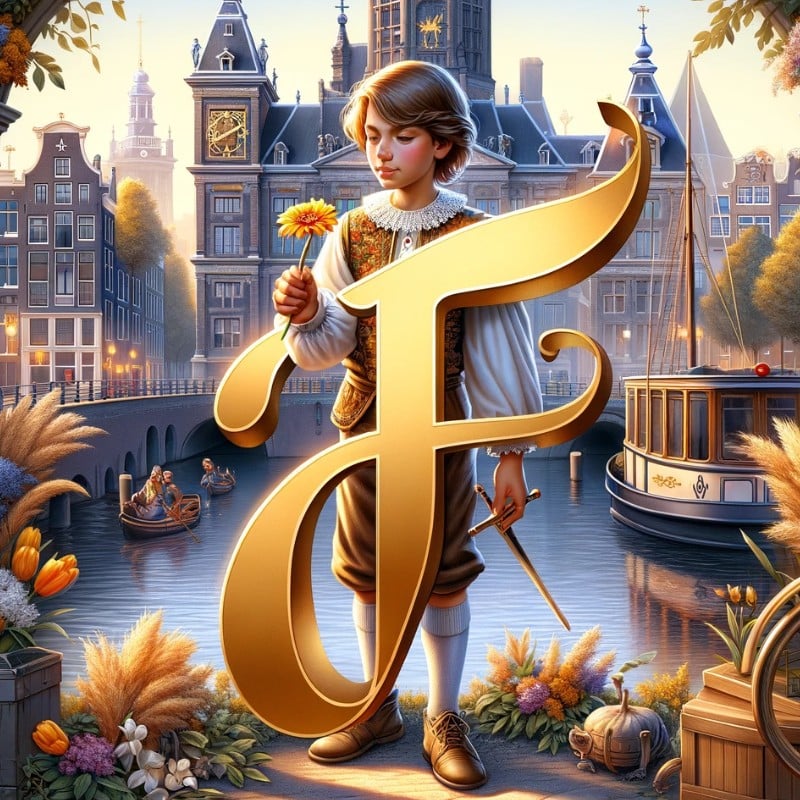
- Fabian: Derived from the Roman clan name Fabius, meaning “bean grower.”
- Falco: A name of Latin origin meaning “falcon,” often used for its association with strength and keen vision.
- Fedde: A Frisian name, short form of Germanic names beginning with “Fridu,” meaning “peace.”
- Felix: A name of Latin origin meaning “happy” or “fortunate.”
- Ferdinand: A name of Germanic origin meaning “bold voyager” or “adventurous.”
- Ferdy: A diminutive of Ferdinand, referring to a “bold voyager” or “adventurous.”
- Filip: The Dutch variant of Philip, meaning “lover of horses.”
- Finn: Derived from the Old Norse Finnr, meaning “person from Finland,” or referring to the Irish mythological hero.
- Florian: A name of Latin origin meaning “flowering” or “flourishing.”
- Floris: Derived from the Latin word “florus,” meaning “flowering” or “in bloom.”
- Fokke: A Frisian name, possibly derived from Germanic “folk,” meaning “people.”
- Folkert: A name of Germanic origin meaning “people’s strength.”
- Fons: Short for Alphonsus, meaning “noble and ready” or “ready for battle.”
- Frank: A name reflecting the historical tribe of the Franks, meaning “free man.”
- Frans: The Dutch form of Francis, meaning “Frenchman” or “free one.”
- Freek: A diminutive of Frederik, meaning “peaceful ruler.”
- Freerk: A variant of Freek, with the same meaning as Frederik.
- Friso: A name that refers to the ancient Frisii tribe or a person from Friesland.
- Frits: A diminutive of Friedrich, meaning “peaceful ruler.”
- Fulco: A name of Germanic origin, meaning “people” or “tribe.”
- Fabio: An Italian name meaning “bean grower,” used in the Netherlands.
- Faddey: A Russian form of Thaddeus, meaning “heart” or “courageous,” used in the Netherlands.
- Faas: A short form of Bonifatius, meaning “good fate” or “good destiny.”
- Fane: A name of uncertain origin, possibly a variant of Fane or Phane, used in the Netherlands.
- Farid: An Arabic name meaning “unique” or “precious,” used in the Netherlands.
- Faris: An Arabic name meaning “knight” or “horseman,” used in the Netherlands.
- Farley: An English surname meaning “fern wood” or “fern clearing,” used in the Netherlands.
- Farris: A variant of Faris, with the same meaning.
- Fausto: An Italian name meaning “auspicious” or “lucky,” used in the Netherlands.
- Feddo: A variant of Fedde, meaning “peace” from Germanic origins.
- Feike: A Frisian name, possibly a variant of Feiko, meaning “peace.”
- Feiko: A Frisian name, possibly derived from Germanic “peace.”
- Femke: A Frisian name typically used for girls but can be unisex, meaning “peace.”
- Fergus: A Scottish and Irish name meaning “man of vigor” or “force,” used in the Netherlands.
- Ferran: A Catalan form of Ferdinand, used in the Netherlands.
- Ferre: A short form of Ferdinand, with the same meaning.
- Fidel: A name of Latin origin meaning “faithful.”
- Filbert: A name of Germanic origin meaning “very bright.”
- Fingal: A name of Gaelic origin meaning “fair stranger,” used in the Netherlands.
- Finley: A Scottish and Irish name meaning “fair-haired hero” or “white warrior,” used in the Netherlands.
- Fintan: An Irish name meaning “white fire” or “white bull,” used in the Netherlands.
- Fisher: An English occupational name for a fisherman, used in the Netherlands.
- Fitz: An Anglo-Norman prefix meaning “son of,” used in compound names.
- Flavio: An Italian name meaning “yellow” or “blond,” used in the Netherlands.
- Flemming: A name of Scandinavian origin meaning “from Flanders,” used in the Netherlands.
- Flint: An English name referring to the hard rock, used metaphorically for toughness.
- Florent: A French name meaning “blooming” or “flourishing,” used in the Netherlands.
- Florus: A variant of Floris, meaning “flowering” or “in bloom.”
- Flynn: An Irish name meaning “son of the red-haired one,” used in the Netherlands.
- Folkard: A variant of Folkert, meaning “people’s strength.”
- Folke: A name of Germanic origin meaning “people” or “tribe.”
- Folkmar: A name of Germanic origin meaning “famous among the people.”
- Fons: A short form of Alphonsus, meaning “noble and ready.”
G

- Gabriël: The Dutch form of Gabriel, meaning “God is my strength.”
- Gerrit: A Dutch diminutive of Gerard, meaning “strong with the spear.”
- Gijs: A short form of Gijsbert, the Dutch form of Gilbert, meaning “bright pledge.”
- Gijsbert: Of Germanic origin, meaning “bright” or “famous” and “pledge.”
- Gillis: A Dutch form of Giles, meaning “shield bearer” or “young goat.”
- Godelief: A unique Dutch name meaning “God’s love.”
- Govert: A Dutch form of Godefrid, meaning “God’s peace.”
- Gradus: A Dutch name derived from the Latin name Gratianus, meaning “grace” or “kindness.”
- Gregor: The Dutch form of Gregory, meaning “watchful” or “alert.”
- Guido: Of Germanic origin, meaning “wood” or “wide,” used in Dutch-speaking countries.
- Guus: A short form of Augustus or Gustaaf, meaning “venerated” or “staff of the Goths.”
- Gust: A short form of Gustaaf, the Dutch form of Gustav, meaning “staff of the Goths.”
- Gustaaf: Of Scandinavian origin, meaning “staff of the Goths.”
- Gustav: Another form of Gustaaf, with the same meaning.
- Gysbert: A variant of Gijsbert, meaning “bright pledge.”
- Gerben: A Frisian name meaning “spear” and “bear.”
- Gerbrand: Of Germanic origin, meaning “spear” and “sword.”
- Gerco: A Dutch name, possibly a diminutive of Gerard, meaning “strong with the spear.”
- Gerhard: The Dutch and German form of Gerard, meaning “strong with the spear.”
- Gerlof: A Frisian name, possibly meaning “spear heritage.”
- Gerrald: A variant of Gerald, meaning “ruler with the spear.”
- Gerrit-Jan: A Dutch compound name combining Gerrit and Jan, meaning “strong with the spear” and “God is gracious.”
- Gert: A short form of Gerrit or Gerhard, meaning “strong with the spear.”
- Gertjan: A compound form of Gert and Jan, with the same meanings as Gerrit-Jan.
- Gerwin: Of Germanic origin, meaning “friend with the spear.”
- Gideon: Of Hebrew origin, meaning “hewer” or “great warrior.”
- Giel: A Dutch diminutive of Michiel or Aegidius, meaning “who is like God?” or “young goat.”
- Gijsbrecht: An older Dutch form of Gijsbert, meaning “bright pledge.”
- Gilbert: Of Norman French origin, meaning “bright pledge,” used in Dutch-speaking countries.
- Gillis: A Dutch form of Giles, meaning “young goat” or “shield bearer.”
- Giovanni: Of Italian origin, meaning “God is gracious,” used in Dutch-speaking countries.
- Glenn: Of Gaelic origin, meaning “valley,” used in the Netherlands.
- Godfried: The Dutch form of Godfrey, meaning “peace of God.”
- Goos: A Dutch name possibly related to Goswin, meaning “God” and “friend.”
- Goran: Of Slavic origin, meaning “mountain man,” used in Dutch-speaking regions.
- Gosse: A Frisian name, possibly a short form of names with the element “goð” or “gods.”
- Gottfried: A variant of Godfried, with the same meaning.
- Gudo: A short form of Guido, meaning “wood” or “wide.”
- Gunther: Of Germanic origin, meaning “warrior” or “battle army.”
- Gustave: A French variant of Gustaaf, meaning “staff of the Goths.”
- Guy: Of French and English origin, meaning “guide” or “leader,” used in Dutch-speaking countries.
- Gysbrecht: An older form of Gijsbrecht, meaning “bright pledge.”
- Gerrald: A variant of Gerald, meaning “ruler with the spear.”
- Geert: A Dutch and Low German form of Gerard, meaning “strong with the spear.”
- Geoffrey: Of French and English origin, meaning “peaceful territory,” used in Dutch-speaking countries.
- George: Of Greek origin, meaning “farmer” or “earth worker,” used in the Netherlands.
- Gerrit-Jan: A compound form of Gerrit and Jan, with the same meanings as Gerrit-Jan.
- Gerardus: A Latinized form of Gerard, meaning “strong with the spear.”
- Gert-Jan: A compound form of Gert and Jan, with the same meanings as Gertjan.
H
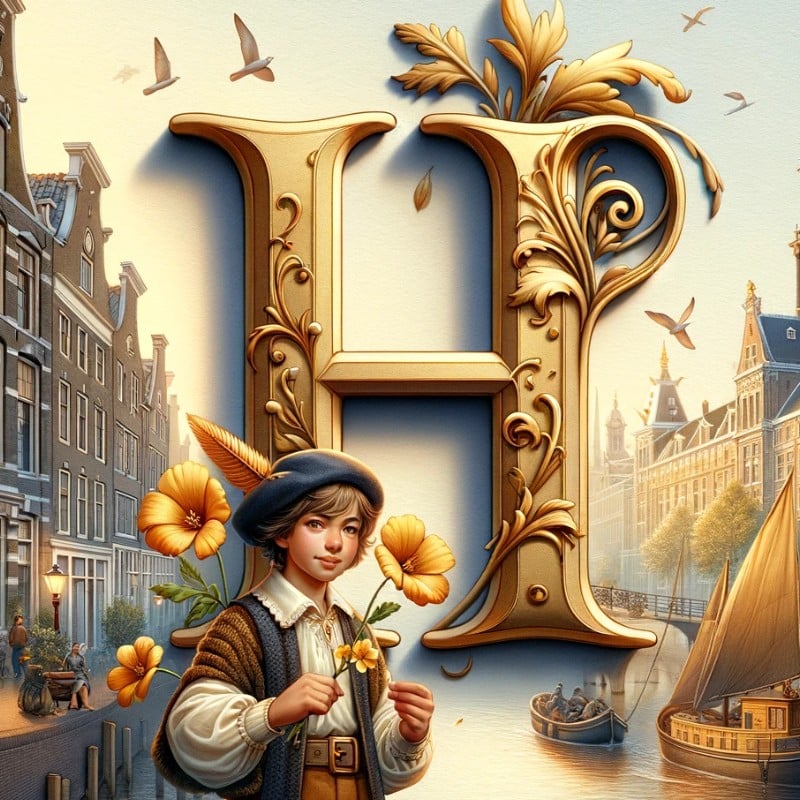
- Hans: A short form of Johannes, the Dutch variant of John, meaning “God is gracious.”
- Harm: A name derived from Germanic elements meaning “army” or “warrior.”
- Hein: A diminutive of Hendrik, the Dutch form of Henry, meaning “home ruler.”
- Hendrik: A Dutch variant of Henry, meaning “home ruler” or “ruler of the household.”
- Henk: A diminutive of Hendrik, meaning “home ruler.”
- Herman: A name of Germanic origin meaning “army man.”
- Hero: A name with Greek origins meaning “demigod” or “warrior,” used in the Netherlands.
- Hidde: A Frisian name, possibly a short form of names containing the Germanic element “hild,” meaning “battle.”
- Hielke: A Frisian name, possibly a diminutive of names containing “heil,” meaning “hale” or “whole.”
- Hugo: A name of Germanic origin meaning “mind” or “intellect.”
- Huub: A diminutive of Hubert, meaning “bright heart” or “bright mind.”
- Huib: A variant of Huub, also a diminutive of Hubert.
- Huibert: A Dutch form of Hubert, meaning “bright heart” or “mind.”
- Hielke: A Frisian name, possibly related to Hielke, with a similar meaning.
- Hjalmar: A name of Scandinavian origin meaning “helmeted warrior,” used in the Netherlands.
- Hansel: A diminutive of Hans, meaning “God is gracious.”
- Harald: A name of Scandinavian origin meaning “leader of the army.”
- Harbert: A Dutch name, possibly a variant of Herbert, meaning “bright army.”
- Harco: A Dutch name, possibly a short form of names containing “hard,” meaning “strong,” “brave,” or “hardy.”
- Harley: An English name meaning “hare’s meadow,” used in the Netherlands.
- Harold: A name of Scandinavian origin meaning “leader of the army,” used in the Netherlands.
- Harrie: A Dutch diminutive of Hendrik or Harald, meaning “home ruler” or “leader of the army.”
- Harro: A German name, possibly a short form of names beginning with “Har” or “Hari,” meaning “army.”
- Hartger: A Dutch name, possibly a variant of the Germanic name Hartgar, meaning “strong spear.”
- Hartwig: A German name meaning “strong battle,” used in the Netherlands.
- Hauke: A Frisian name, possibly derived from Germanic “hauh,” meaning “high” or “noble.”
- Hayo: A Frisian name, possibly a short form of names containing “hag,” meaning “enclosure” or “protected place.”
- Heiko: A Low German diminutive of Heinrich, meaning “home ruler.”
- Heimerik: A Dutch name, possibly a variant of Heinrich, meaning “home ruler.”
- Heinrich: A German name meaning “home ruler,” used in the Netherlands.
- Heintje: A diminutive of Hein, meaning “home ruler.”
- Helmar: A name of Germanic origin meaning “famous protector,” used in the Netherlands.
- Helmut: A German name meaning “helmet,” “protection,” used in the Netherlands.
- Hemmo: A name of Germanic origin, possibly a short form of names with “heim,” meaning “home.”
- Hendrick: A variant of Hendrik, meaning “home ruler.”
- Hennie: A diminutive of Hendrik, meaning “home ruler.”
- Henning: A Low German diminutive of Heinrich, meaning “home ruler.”
- Henricus: A Latinized form of Hendrik, meaning “home ruler.”
- Herbert: A name of Germanic origin meaning “bright army.”
- Hercules: A name of Greek origin associated with the mythological hero known for his strength.
- Heribert: A German name meaning “bright army,” used in the Netherlands.
- Hermanus: A Latinized form of Herman, meaning “army man.”
- Herwin: A German name meaning “friend of the army,” used in the Netherlands.
- Hessel: A Frisian name, possibly a diminutive of names containing “hag,” “enclosure,” or “protected place.”
- Hette: A Frisian name, possibly a short form of names containing “hete,” meaning “fierce” or “stern.”
- Hidde: A Frisian name, possibly derived from “hild,” meaning “battle.”
- Hieronymus: A name of Greek origin meaning “sacred name,” used in the Netherlands.
- Hilbert: A name of Germanic origin meaning “bright battle.”
- Hilbrand: A Dutch name, possibly a combination of “hild,” meaning “battle,” and “brand,” meaning “sword.”
- Hildo: A name of Germanic origin, possibly a short form of names containing “hild,” meaning “battle.”
- Hille: A Frisian name, possibly a diminutive of names containing “hild,” meaning “battle.”
- Hilmar: A name of Germanic origin meaning “famous protector,” used in the Netherlands.
- Hjalmar: A Scandinavian name meaning “helmeted warrior,” used in the Netherlands.
- Hobbe: A Frisian name, possibly a diminutive of Hobbert, a form of Hubert.
- Huib: A variant of Huub, a diminutive of Hubert.
- Huibert: A Dutch form of Hubert, meaning “bright heart.”
- Hugo: A name of Germanic origin meaning “mind” or “intellect.”
- Humphrey: A name of Germanic origin meaning “peaceful warrior,” used in the Netherlands.
- Hylke: A Frisian name, possibly related to Hielke, with a similar meaning.
I

- Ibe: A Frisian name, possibly a diminutive of longer names beginning with “Ib,” of uncertain meaning.
- Iddo: A name of Hebrew origin meaning “timely” or “at the appointed time.”
- Ido: A Frisian short form of Germanic names beginning with “Id,” meaning “work” or “labor.”
- Idse: A Frisian name, possibly related to Ido, with a similar meaning.
- Iemke: A Frisian diminutive form of names beginning with “Irm,” meaning “whole” or “universal.”
- Ies: A Frisian diminutive of names beginning with “Ise,” which could be related to ice or iron in Old Germanic.
- Igor: A name of Russian origin, from the Old Norse name Yngvarr, meaning “protected by Yngvi” (a Norse god).
- IJsbrand: A Dutch name composed of elements meaning “ice” and “sword” or “brand.”
- Ike: A diminutive of Isaac, meaning “he will laugh” or “he will rejoice” in Hebrew.
- Ilco: A Dutch name, possibly a variant of Ilko, a diminutive of names beginning with “Ilf” or “Ilv,” meaning “wolf.”
- Ilja: A Dutch form of the Russian name Ilya, which is the Russian form of Elijah, meaning “my God is Yahweh.”
- Iman: An Arabic name meaning “faith” or “belief,” used in the Netherlands.
- Immanuel: A Hebrew name meaning “God is with us.”
- Imre: A Hungarian name derived from Emery or Amalric, meaning “work” or “power.”
- Indy: A name of American origin, often short for Indiana or independent, used in the Netherlands.
- Ingmar: A Scandinavian name combining “Ing” (a Norse god) with “mar,” meaning “famous.”
- Ingo: A name of Germanic origin, related to the name of the Norse god Ing or Yngvi.
- Ingram: A name of Germanic origin meaning “raven of peace” or “raven of Anglia.”
- Ira: A Hebrew name meaning “watchful one,” used in the Netherlands.
- Isaac: A name of Hebrew origin meaning “he will laugh” or “he will rejoice.”
- Isaak: A variant spelling of Isaac, with the same meaning.
- Isai: A short form of Isaiah, a Hebrew name meaning “salvation of the Lord.”
- Ischa: A name of uncertain origin, possibly a variant of Isha, which means “man” in Hebrew.
- Ise: A Frisian name, possibly related to Ies, with a similar meaning.
- Ishaq: An Arabic form of Isaac, meaning “he will laugh” or “he will rejoice.”
- Isidoor: A Dutch form of Isidore, meaning “gift of Isis” (the Egyptian goddess).
- Ismail: An Arabic form of Ishmael, meaning “God will hear.”
- Ivar: A Scandinavian name meaning “yew” or “bow warrior,” from the Old Norse Ívarr.
- Iven: A name of uncertain origin, possibly related to the Old Norse name Ivar.
- Ivo: A name of Germanic origin meaning “yew,” “bow warrior,” or “archer.”
- Iwan: A Dutch form of Ivan, the Slavic form of John, meaning “God is gracious.”
- Izak: A variant of Isaac, meaning “he will laugh” or “he will rejoice.”
- Izzy: A diminutive of names like Isaac or Isidore, used in the Netherlands.
J

- Jaap: A Dutch diminutive of Jacob, meaning “supplanter.”
- Jacob: Of Hebrew origin, meaning “supplanter” or “held by the heel.”
- Jacobus: The Latin form of Jacob, also meaning “supplanter.”
- Jacques: A French variant of Jacob, used in Dutch-speaking regions, meaning “supplanter.”
- Jaimy: A variant of Jamie, which is a diminutive of James, meaning “supplanter.”
- Jan: A Dutch form of John, meaning “God is gracious.”
- Jannes: A Dutch variant of Johannes, which is the Dutch form of John.
- Jasper: Of Persian origin, meaning “treasurer,” a name commonly used in the Netherlands.
- Jelle: A Frisian name, possibly a diminutive of names beginning with the Germanic element “gail,” meaning “lively.”
- Jens: A Dutch and Scandinavian variant of John, meaning “God is gracious.”
- Jeppe: A Danish and Dutch diminutive of Jasper or Jacob, meaning “treasurer” or “supplanter.”
- Jeremias: A Dutch form of Jeremiah, meaning “exalted by God.”
- Jeroen: A Dutch form of Jerome, meaning “sacred name.”
- Jesse: Of Hebrew origin, meaning “gift” or “wealth,” used in Dutch-speaking countries.
- Joachim: Of Hebrew origin, meaning “raised by Yahweh,” used in Dutch-speaking regions.
- Jochem: A Dutch diminutive of Joachim, with the same meaning.
- Joep: A Dutch diminutive of Joseph, meaning “He will add.”
- Johan: A Dutch form of John, meaning “God is gracious.”
- Johannes: The Dutch form of John, meaning “God is gracious.”
- Jonas: Of Hebrew origin, meaning “dove,” used in the Netherlands.
- Jonathan: Of Hebrew origin, meaning “God has given,” used in Dutch-speaking countries.
- Joost: A Dutch form of Jodocus, which may mean “experienced in battle.”
- Jordi: A Catalan form of George, meaning “farmer,” used in Dutch-speaking regions.
- Joren: A Dutch variant of George, meaning “farmer.”
- Jorik: A Dutch diminutive of George, meaning “farmer.”
- Joris: A Dutch form of George, meaning “farmer” or “earth worker.”
- Jornt: A Frisian name, possibly related to Jorn, meaning “farmer.”
- Jos: A Dutch short form of Jozef, which is the Dutch form of Joseph.
- Jozef: The Dutch form of Joseph, meaning “He will add.”
- Julian: Of Latin origin, meaning “youthful” or “downy,” used in the Netherlands.
- Julius: Of Latin origin, possibly related to the Roman god Jupiter, used in Dutch-speaking regions.
- Jurgen: A Low German and Dutch form of George, meaning “farmer.”
- Justus: Of Latin origin, meaning “just” or “righteous,” used in Dutch-speaking regions.
- Jaap-Jan: A Dutch compound name combining Jaap and Jan, meaning “supplanter” and “God is gracious.”
- Jaimie: A variant of Jamie, meaning “supplanter,” used in Dutch-speaking countries.
- Jairo: Of Hebrew origin, meaning “he shines,” used in the Netherlands.
- Jakob: A variant of Jacob, meaning “supplanter,” used in Dutch-speaking regions.
- Jamal: Of Arabic origin, meaning “beauty,” used in the Dutch multicultural society.
- James: Of Hebrew origin, meaning “supplanter,” used in Dutch-speaking countries.
- Jan-Peter: A Dutch compound name, combining Jan and Peter, meaning “God is gracious” and “rock.”
- Jan-Willem: A Dutch compound name combining Jan and Willem, with Jan meaning “God is gracious” and Willem meaning “will helmet” or “protection.”
- Jari: Of Finnish origin, meaning “helmeted warrior,” used in Dutch-speaking regions.
- Jarich: A Frisian name of uncertain meaning, used in the Netherlands.
- Jarmo: Of Finnish origin, a variant of Jari, meaning “helmeted warrior,” used in the Netherlands.
- Jarno: A Finnish and Dutch name, possibly related to Jari, meaning “helmeted warrior.”
- Jasper-Jan: A Dutch compound name combining Jasper and Jan, with Jasper meaning “treasurer” and Jan meaning “God is gracious.”
- Jean: A French form of John, meaning “God is gracious,” used in Dutch-speaking regions.
- Jean-Paul: A compound name of French origin, combining Jean and Paul, meaning “God is gracious” and “small” or “humble.”
- Jeffrey: Of Germanic origin, meaning “peaceful place,” used in Dutch-speaking countries.
- Jelmer: A Dutch name of uncertain origin, possibly related to Jelle, meaning “lively.”
- Jelte: A Frisian name, possibly a diminutive of names beginning with “gail,” meaning “lively.”
- Jelle-Jan: A Dutch compound name combining Jelle and Jan, with Jelle meaning “lively” and Jan meaning “God is gracious.”
K

- Kai: A name of multiple origins, it can be Frisian meaning “warrior,” or of Scandinavian origin, possibly derived from the Old Norse name “Kári.”
- Kaj: A variant of Kai, with the same potential meanings.
- Karel: The Dutch form of Charles, meaning “free man.”
- Kasper: The Dutch form of Casper or Jasper, possibly meaning “treasurer” or “bearer of treasure.”
- Kees: A diminutive of Cornelis, meaning “horn.”
- Kerem: A name of Turkish origin meaning “generous” or “noble,” used in the Netherlands.
- Kester: A Dutch variant of Christopher, meaning “bearer of Christ.”
- Kian: A name of Irish origin meaning “ancient” or “enduring,” used in the Netherlands.
- Kieran: Of Irish origin meaning “little dark one,” used in the Netherlands.
- Klaas: A Dutch diminutive of Nicholas, meaning “victory of the people.”
- Koen: A short form of Coenraad, the Dutch variant of Conrad, meaning “bold counsel.”
- Koert: A Dutch variant of Kurt, which is a short form of Konrad or Conrad, meaning “bold counsel.”
- Krijn: A short form of Cornelis, meaning “horn.”
- Kristian: A variant of Christian, meaning “follower of Christ.”
- Kurt: A name of German origin, a short form of Konrad or Conrad, meaning “bold counsel.”
- Kyan: A modern name of uncertain origin, possibly an alternate spelling of Cian, which means “ancient” in Irish.
L
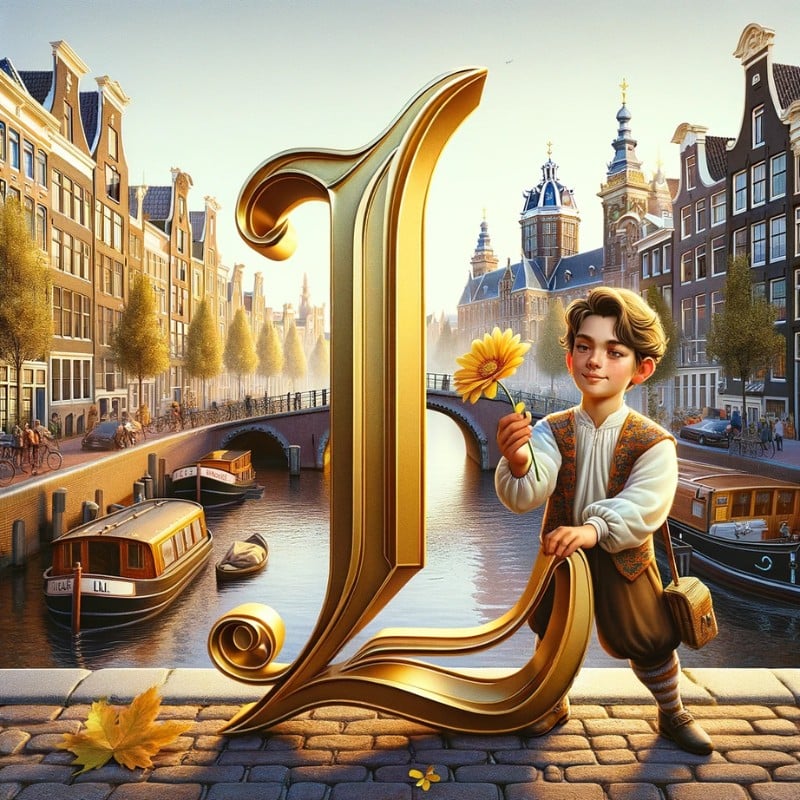
- Lars: A Scandinavian name derived from the Roman name Laurentius, meaning “from Laurentum” or “crowned with laurel.”
- Laurens: The Dutch form of Laurence or Lawrence, meaning “from Laurentum” or “crowned with laurel.”
- Leendert: A Dutch variant of Leonard, meaning “brave lion.”
- Leo: A Latin name meaning “lion,” used across various cultures including the Netherlands.
- Leon: A name of Greek origin meaning “lion,” used in the Netherlands.
- Leopold: A name of Germanic origin meaning “bold people” or “brave people.”
- Leroy: A name of French origin meaning “the king,” used in the Netherlands.
- Levi: A Hebrew name meaning “joined,” “attached,” or in a Biblical context, the name of the third son of Jacob.
- Lex: A short form of Alexander, meaning “defender of men.”
- Liam: An Irish short form of William, meaning “strong-willed warrior” or “resolute protection.”
- Lieven: A name of Dutch origin meaning “dear” or “beloved.”
- Loek: A Dutch diminutive of Lucas or Lukas, meaning “from Lucania.”
- Lorenz: A German form of Laurence, meaning “from Laurentum” or “crowned with laurel,” used in the Netherlands.
- Lourens: A variant of Laurens, with the same meaning.
- Louie: A variant of Louis or Ludwig, meaning “famous warrior,” used in the Netherlands.
- Luc: A Dutch variant of Luke or Lucas, meaning “from Lucania.”
- Lucas: A form of Luke, meaning “from Lucania,” an ancient region in Southern Italy.
- Luca: An Italian variant of Lucas, with the same meaning, used in the Netherlands.
- Ludwig: A German name meaning “famous warrior,” used in the Netherlands.
- Luuk: A Dutch form of Luke, meaning “from Lucania.”
- Lukas: A form of Lucas, meaning “from Lucania,” used in the Netherlands.
- Lute: A name of uncertain origin, possibly a diminutive of Lutbert, which is a Germanic name meaning “people’s brightness.”
- Luther: A name of German origin meaning “army people” or “warrior,” also associated with the Protestant Reformation leader Martin Luther.
- Lyam: A variant of Liam, meaning “strong-willed warrior” or “resolute protection.”
M
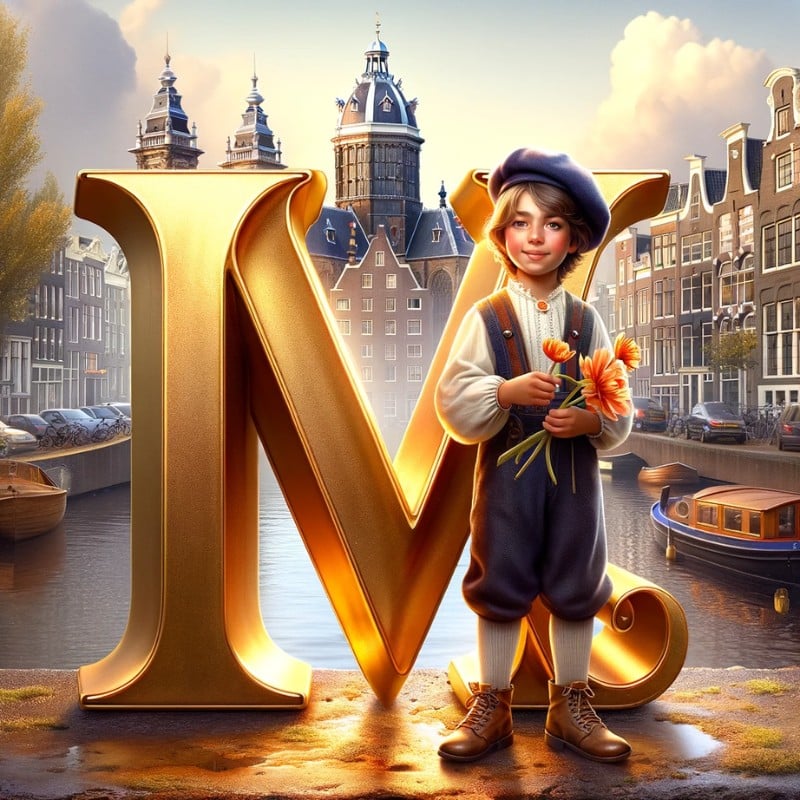
- Maarten: The Dutch form of Martin, meaning “warlike” or “of Mars.”
- Machiel: A Dutch variant of Michael, meaning “who is like God?”
- Marcel: Of French origin, meaning “little warrior,” used in the Netherlands.
- Marco: The Italian and Dutch form of Mark, meaning “warlike.”
- Marcus: The Latin and Dutch form of Mark, also meaning “warlike.”
- Marius: Of Latin origin, possibly related to the Roman god Mars, meaning “male” or “virile.”
- Mark: Of Latin origin, derived from Mars, the Roman god of war, used in Dutch-speaking countries.
- Markus: A variant of Marcus, with the same meaning, used in the Netherlands.
- Mart: A short form of Maarten, meaning “warlike.”
- Martijn: The Dutch form of Martin, meaning “warlike.”
- Mathijs: The Dutch form of Matthias or Matthew, meaning “gift of God.”
- Maurice: Of Latin origin, meaning “dark-skinned” or “Moorish,” used in Dutch-speaking regions.
- Maurits: The Dutch form of Maurice, meaning “Moorish” or “dark-skinned.”
- Max: A short form of Maximilian or Maxwell, meaning “greatest” or “great spring,” used in the Netherlands.
- Maxim: A form of Maximilian, meaning “greatest,” used in Dutch-speaking countries.
- Maximiliaan: The Dutch form of Maximilian, meaning “greatest.”
- Meindert: A Dutch name, possibly a variant of Meinhard, meaning “firm” and “strong.”
- Menno: A Frisian name derived from Germanic names beginning with “magin,” meaning “strength.”
- Merijn: A Dutch name of uncertain origin, possibly related to the Latin name Marinus.
- Micha: A short form of Michael, meaning “who is like God?” used in the Netherlands.
- Michaël: The Dutch form of Michael, meaning “who is like God?”
- Michel: The Dutch and French form of Michael, with the same meaning.
- Mick: A diminutive of Michael, meaning “who is like God?” used in the Netherlands.
- Miguel: Of Spanish origin, meaning “who is like God?” used in Dutch-speaking countries.
- Milan: Of Slavic origin, meaning “kind” or “loving,” used in the Netherlands.
- Mitchell: Of English origin, a variant of Michael, meaning “who is like God?” used in Dutch-speaking regions.
- Mohammed: Of Arabic origin, meaning “praised,” used in the Dutch multicultural society.
- Morten: A Dutch and Scandinavian form of Martin, meaning “warlike.”
- Mozes: The Dutch form of Moses, meaning “delivered from the water.”
- Maas: A Dutch name derived from the river Maas, a name given to those who lived near the river.
- Maikel: A Dutch variant of Michael, meaning “who is like God?”
- Marnix: A Dutch name of uncertain origin, possibly from the French place name Marnac.
- Matthijs: A Dutch form of Matthias, meaning “gift of God.”
- Mauritz: A variant of Maurits, with the same meaning.
- Meine: A Frisian and Dutch name, possibly derived from Germanic names with “magin,” meaning “strength.”
- Melvin: Of English origin, meaning “council protector” or “mill worker,” used in Dutch-speaking regions.
- Merlin: Of Welsh origin, meaning “sea fortress,” occasionally used in the Netherlands.
- Merten: A Low German form of Martin, meaning “warlike.”
- Michael: Of Hebrew origin, meaning “who is like God?” used in Dutch-speaking countries.
- Michiel: The Dutch form of Michael, with the same meaning.
- Milo: Of Germanic origin, meaning “merciful” or “mild,” used in the Netherlands.
- Miquel: A Catalan form of Michael, meaning “who is like God?” used in Dutch-speaking regions.
- Mischa: A Russian diminutive of Michael, meaning “who is like God?” adopted in Dutch-speaking areas.
- Moreno: Of Spanish origin, meaning “dark-haired” or “tanned,” used in the Netherlands.
- Morris: Of English origin, meaning “dark-skinned” or “Moorish,” used in Dutch-speaking countries.
- Moses: Of Hebrew origin, meaning “drawn out of the water,” used in Dutch-speaking regions.
- Myron: Of Greek origin, meaning “myrrh,” used in the Netherlands.
N

- Naud: A Dutch name of uncertain origin, possibly a variant of the Germanic name “Norbert” meaning “north bright.”
- Neal: A variant of Neil, of Irish origin meaning “champion” or “cloud,” used in the Netherlands.
- Nelis: A diminutive form of Cornelis, meaning “horn.”
- Nico: A short form of Nicolaas, the Dutch form of Nicholas, meaning “victory of the people.”
- Niels: A Dutch and Scandinavian variant of Neil, meaning “champion” or “passionate.”
- Niek: A diminutive of Nicolaas, meaning “victory of the people.”
- Niel: A variant of Neil, meaning “champion” or “cloud.”
- Nigel: Of English origin meaning “dark” or “black,” used in the Netherlands.
- Nik: A short form of Nikolaas or Nicholas, meaning “victory of the people.”
- Nikita: A Russian name of Greek origin, meaning “victor” or “unconquered,” used in the Netherlands.
- Niko: A variant of Nico, meaning “victory of the people.”
- Nikolaas: The Dutch form of Nicholas, meaning “victory of the people.”
- Nils: A Scandinavian form of Neil, meaning “champion” or “passionate.”
- Noah: A name of Hebrew origin meaning “rest” or “comfort.”
- Noam: A Hebrew name meaning “pleasantness” or “charm.”
- Noel: Of French origin meaning “Christmas,” used in the Netherlands.
- Norbert: A name of Germanic origin meaning “north bright.”
- Norman: Of English origin referring to the Norsemen or “men from the north,” used in the Netherlands.
O

- Olaf: Of Norse origin, meaning “ancestor’s relic,” used in the Netherlands.
- Olivier: The Dutch and French form of Oliver, meaning “olive tree.”
- Onno: A name of possibly Frisian origin, the meaning is not clear but it is used in the Netherlands.
- Oscar: Of Irish origin, meaning “deer lover” or “God spear,” used in Dutch-speaking countries.
- Otto: Of Germanic origin, meaning “wealth,” “fortune,” or “prosperous.”
- Owen: Of Welsh origin, meaning “young warrior” or “noble,” used in the Netherlands.
- Odin: In reference to the Norse god Odin, associated with wisdom and knowledge, used in Dutch-speaking regions.
- Oene: A Frisian name possibly related to the name Owen, meaning “well-born” or “noble.”
- Okke: A Frisian name, possibly a diminutive of names beginning with “od,” meaning “possessions” or “wealth.”
- Ole: Of Scandinavian origin, meaning “ancestor’s descendant,” used in the Netherlands.
- Olger: A Dutch name, possibly a variant of Ulger, which may mean “heritage of the ancestors.”
- Olivier: A variant of Oliver, meaning “olive tree,” popular in Dutch-speaking countries.
- Olof: A variant of Olaf, with the same meaning, used in the Netherlands.
- Onne: A name of uncertain origin, used in Dutch-speaking regions.
- Orlando: Of Italian origin, meaning “famous throughout the land,” used in the Netherlands.
- Oscar: A name of Irish origin, meaning “deer lover” or “God spear,” used in Dutch-speaking countries.
- Otis: Of Germanic origin, meaning “wealthy,” used in Dutch-speaking regions.
- Ottmar: A German name meaning “prosperous in battle,” occasionally used in the Netherlands.
- Ouwe: A Dutch name, possibly a variant of the name Odo or Otto, meaning “wealth” or “fortune.”
- Oswald: Of English origin, meaning “divine power,” used in Dutch-speaking countries.
- Oswin: Of English origin, meaning “God’s friend,” used in the Netherlands.
- Otte: A Dutch diminutive of Otto, meaning “wealth” or “fortune.”
- Ottokar: A German name meaning “happy army,” occasionally found in Dutch-speaking regions.
- Ovidius: Of Latin origin, meaning “shepherd,” used in the Netherlands.
- Owen: A name of Welsh origin, meaning “young warrior” or “noble,” used in Dutch-speaking countries.
P
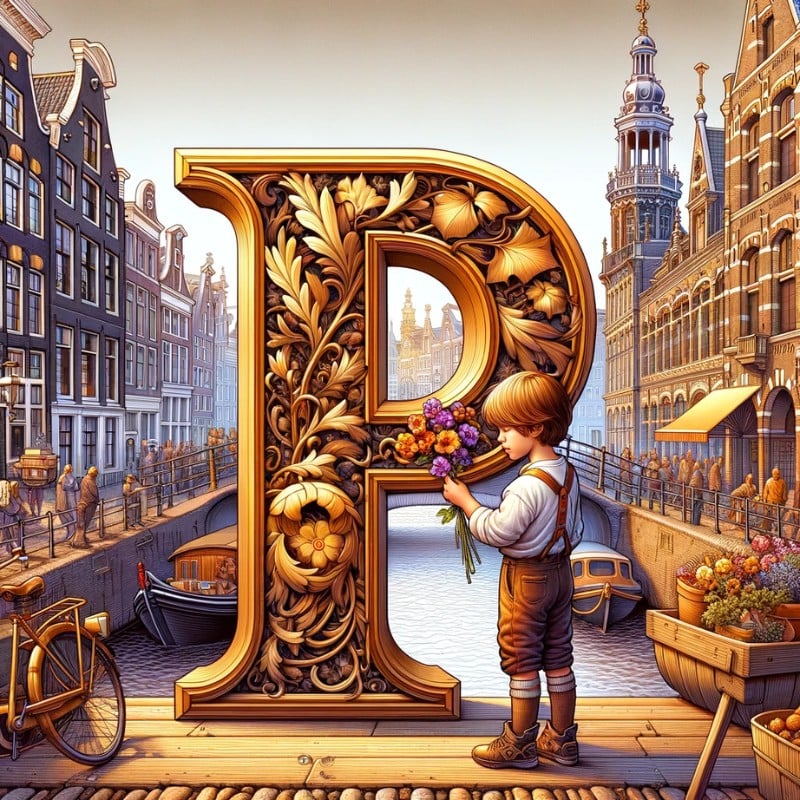
- Pascal: A name of French origin meaning “related to Easter” or “born on Easter,” used in the Netherlands.
- Patrick: A name of Latin origin meaning “nobleman” or “patrician,” used in the Netherlands.
- Paul: A name of Latin origin meaning “small” or “humble.”
- Paulus: The Latinized form of Paul, meaning “small” or “humble.”
- Pepijn: The Dutch form of Pepin, which has uncertain origins, possibly meaning “awe-inspiring.”
- Peter: The Dutch form of Peter, from the Greek name Petros meaning “rock” or “stone.”
- Pieter: A Dutch variant of Peter, meaning “rock” or “stone.”
- Pim: A short form of Willem or Wilhelm, meaning “will helmet” or “resolute protector.”
- Pleun: A name of uncertain origin, possibly a short form of Apollonius or related to the Dutch word ‘pleunen’ meaning “to complain.”
- Pol: A short form of Paul, meaning “small” or “humble.”
- Puck: Traditionally a unisex name of uncertain origin, it can be associated with the mischievous fairy character in Shakespeare’s “A Midsummer Night’s Dream.”
Q
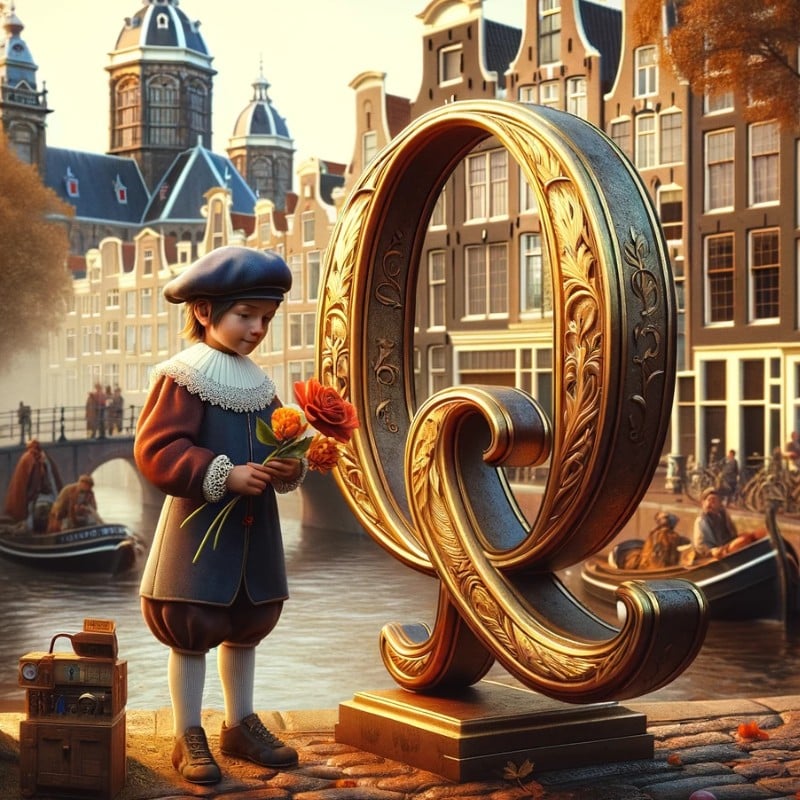
- Quentin: Of Latin origin, meaning “fifth,” used in Dutch-speaking countries.
- Quint: A short form of Quinten or Quintus, meaning “fifth” in Latin.
- Quinten: The Dutch form of Quentin, meaning “fifth,” often referring to the fifth-born child or born in the fifth month.
- Quintijn: A Dutch variant of Quintin, with the same meaning as Quentin.
- Quintin: Another variant of Quentin, used in Dutch-speaking regions.
- Quintus: A Roman praenomen, or given name, meaning “fifth” in Latin, occasionally used in the Netherlands.
- Quirijn: A Dutch name derived from the Roman name Quirinus, which may mean “spear” or could be related to the Roman god of the same name.
- Quirinus: Of Latin origin, possibly meaning “spear” or referring to the Roman god of war, used in Dutch-speaking countries.
R
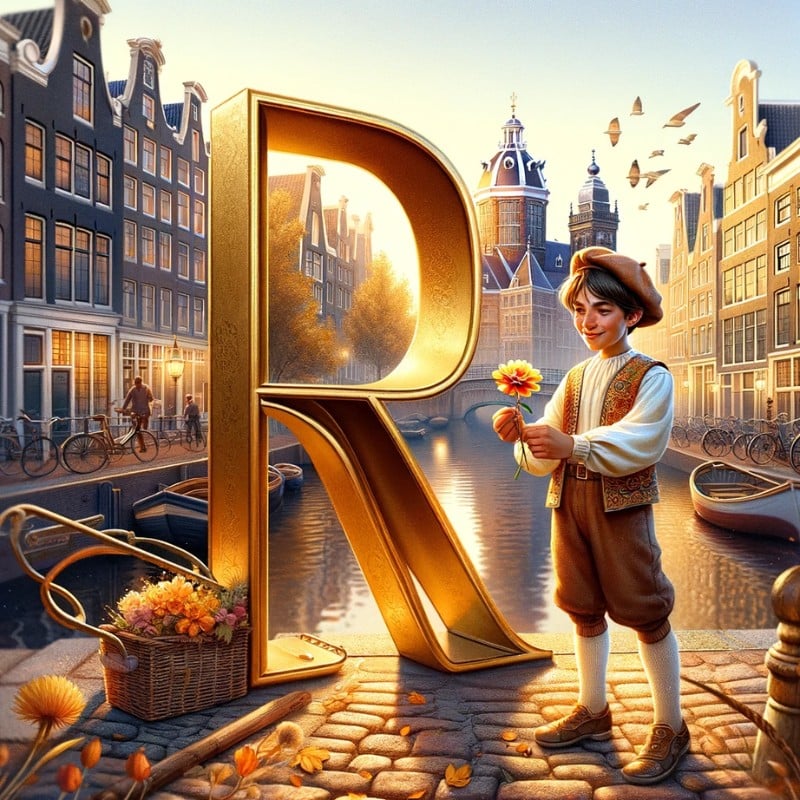
- Raf: A short form of Raphael, meaning “God has healed.”
- Ralf: A variant of Ralph, derived from the Old Norse Raðulfr, meaning “counsel wolf.”
- Ramon: A Dutch form of Raymond, meaning “wise protector.”
- Ramses: An Egyptian name meaning “born of the sun god Ra,” used in the Netherlands.
- Randy: An English name, often a short form of Randall or Randolph, meaning “shield wolf” or “rim of the shield.”
- Raoul: A French form of Ralph, meaning “counsel wolf,” used in the Netherlands.
- Raphael: A name of Hebrew origin meaning “God has healed.”
- Rasmus: A Scandinavian form of Erasmus, meaning “beloved” or “desired.”
- Raymond: A name of Germanic origin meaning “wise protector.”
- Rein: A short form of names beginning with the Germanic element “ragin,” meaning “advice.”
- Reinder: A Dutch form of Rainer, meaning “deciding warrior.”
- Reinhard: A German name meaning “brave counsel,” used in the Netherlands.
- Reinier: A Dutch variant of Rayner or Reiner, meaning “deciding warrior.”
- Rembrandt: A Dutch name, possibly meaning “sword advisor.” Famous bearer: the painter Rembrandt van Rijn.
- Remco: A Dutch name, a combination of elements meaning “advice” and “combat.”
- Remi: A French name meaning “oarsman” or “remedy,” used in the Netherlands.
- Remy: A variant of Remi, with the same meaning.
- René: A French name meaning “reborn,” used in the Netherlands.
- Rens: A short form of Laurens or other names ending in “-rens.”
- Reuben: A name of Hebrew origin meaning “behold, a son.”
- Ricardo: A Portuguese and Spanish form of Richard, meaning “strong ruler,” used in the Netherlands.
- Richard: A name of Germanic origin meaning “strong ruler.”
- Rick: A short form of Richard, meaning “strong ruler.”
- Rico: A diminutive of Ricardo or Heinrich, meaning “strong ruler” or “home ruler.”
- Rik: A Dutch short form of Hendrik or Roderick, meaning “home ruler” or “famous ruler.”
- Rinke: A Frisian diminutive of names ending in “-rink,” of uncertain meaning.
- Rob: A short form of Robert, meaning “bright fame.”
- Robert: A name of Germanic origin meaning “bright fame.”
- Robin: A diminutive of Robert, meaning “bright fame,” often used as a unisex name.
- Robrecht: An old Dutch form of Robert, meaning “bright fame.”
- Rodney: An English surname meaning “Hroda’s island,” used as a given name in the Netherlands.
- Roel: A Dutch short form of Roeland, meaning “famous land.”
- Roeland: A Dutch form of Roland, meaning “famous land.”
- Rogier: A Dutch form of Roger, meaning “famous spear.”
- Roland: A name of Germanic origin meaning “famous land.”
- Roman: A name of Latin origin meaning “from Rome” or “Roman.”
- Romeo: An Italian name, possibly derived from the Latin “Romeo,” meaning “a pilgrim to Rome.”
- Ronald: A name of Norse origin meaning “ruler’s counselor.”
- Ronnie: A diminutive of Ronald, meaning “ruler’s counselor.”
- Roos: A Dutch surname meaning “rose,” occasionally used as a given name.
- Rory: An Anglicized form of the Gaelic name Ruaidhrí, meaning “red king.”
- Roscoe: An English surname meaning “deer forest,” used as a given name in the Netherlands.
- Rowan: A name of Gaelic origin meaning “little redhead,” used as a unisex name.
- Roy: A name of Norman origin meaning “king.”
- Ruben: A variant of Reuben, meaning “behold, a son.”
- Rudolf: A name of Germanic origin meaning “famous wolf.”
- Rudy: A diminutive of Rudolf, meaning “famous wolf.”
- Ruud: A Dutch short form of Rudolf, meaning “famous wolf.”
- Ryan: An Irish name meaning “little king.”
S

- Sander: A Dutch short form of Alexander, meaning “defender of mankind.”
- Sandro: A diminutive of Alessandro, the Italian form of Alexander, used in Dutch-speaking areas.
- Seb: A short form of Sebastian, meaning “venerable” or “revered.”
- Sebastian: Of Latin origin, meaning “venerable” or “revered,” used in the Netherlands.
- Sem: A Dutch name, possibly a short form of Samuel or “name” in Hebrew.
- Sep: A short form of Joseph, meaning “He will add.”
- Serge: Of Russian origin, derived from a Roman family name, used in Dutch-speaking regions.
- Sergei: The Russian form of Sergius, meaning “servant,” used in the Netherlands.
- Sergio: Of Latin origin, from the Roman family name Sergius, used in Dutch-speaking areas.
- Seth: Of Hebrew origin, meaning “appointed,” used in the Netherlands.
- Siebe: A Frisian name, possibly a short form of names beginning with “sigu,” meaning “victory.”
- Siem: A Dutch diminutive of Simon, meaning “he has heard.”
- Sil: A Dutch short form of names like Silvester, meaning “wooded” or “wild.”
- Silvan: Of Latin origin, meaning “forest” or “wood,” used in Dutch-speaking regions.
- Silvester: Of Latin origin, meaning “wooded” or “wild,” used in the Netherlands.
- Simon: Of Hebrew origin, meaning “he has heard,” used in Dutch-speaking countries.
- Sjors: A Dutch variant of George, meaning “farmer” or “earth worker.”
- Sjoerd: A Frisian name, possibly a variant of Siegfried, meaning “victory” and “peace.”
- Sjef: A Dutch diminutive of Jozef, meaning “He will add.”
- Skip: A name of English origin, meaning “shipmaster” or “skipper,” used in Dutch-speaking regions.
- Stef: A short form of Stefan or Stephan, meaning “crown” or “wreath.”
- Stefan: Of Greek origin, meaning “crown” or “wreath,” used in the Netherlands.
- Stein: A Dutch and German name, meaning “stone.”
- Sten: A Scandinavian name, derived from Stein, meaning “stone,” used in Dutch-speaking countries.
- Stijn: A Dutch short form of names like Constantijn, meaning “constant” or “steadfast.”
- Storm: A name of English origin, referring to the weather phenomenon, used in the Netherlands.
- Stefanus: The Latin form of Stephen, meaning “crown” or “wreath,” used in Dutch-speaking regions.
- Sven: Of Scandinavian origin, meaning “young man” or “young warrior,” used in the Netherlands.
- Swen: A variant of Sven, with the same meaning.
- Sybren: A Frisian name, possibly a variant of Sibren, derived from names beginning with “sigu,” meaning “victory.”
- Sybrand: A Dutch name, possibly a variant of Siegbrand, meaning “victory” and “sword.”
- Sybren: A variant of Sybren, with the same meaning.
- Symon: An older spelling of Simon, meaning “he has heard.”
- Sytske: A Frisian name, possibly a diminutive of names beginning with “sigu,” meaning “victory.”
T
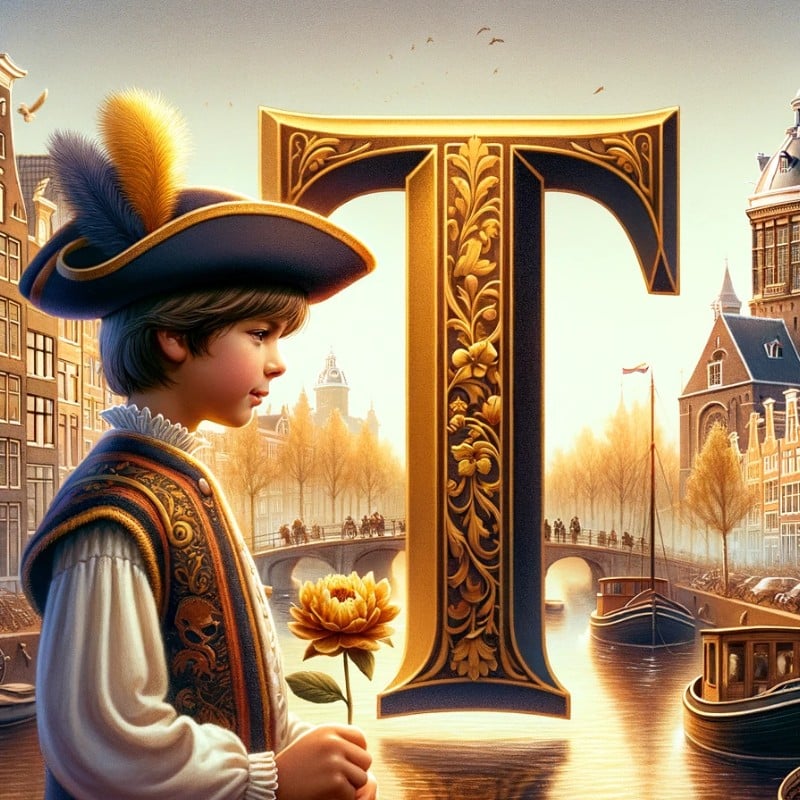
- Teun: A Dutch short form of Antonius, which is the Latin form of Anthony, meaning “priceless” or “highly praiseworthy.”
- Thierry: A French form of Theodoric, meaning “ruler of the people,” used in the Netherlands.
- Thijs: A Dutch diminutive of Matthijs or Matthias, meaning “gift of God.”
- Thijmen: A Dutch variant of Tymen, itself a short form of Dietmar, meaning “famous among the people.”
- Thomas: A name of Aramaic origin meaning “twin.”
- Thom: A short form of Thomas, meaning “twin.”
- Thor: A name derived from the Norse god of thunder, used in the Netherlands.
- Tiemen: A variant of Tymen or Dietmar, meaning “famous among the people.”
- Tijn: A Dutch diminutive of Martin or Martijn, meaning “warlike.”
- Timo: A short form of Timotheus, the Dutch form of Timothy, meaning “honoring God.”
- Timotheus: The Latin form of Timothy, meaning “honoring God.”
- Tobias: A name of Hebrew origin meaning “God is good.”
- Tom: A short form of Thomas, meaning “twin.”
- Tomas: A variant of Thomas, meaning “twin.”
- Ton: A short form of Antonius, meaning “priceless” or “highly praiseworthy.”
- Toon: A Dutch short form of Antonius, with the same meaning as Ton.
- Tygo: A name of uncertain origin, possibly derived from the ancient Greek “Tyche,” meaning “fortune” or “luck.”
- Tymen: A Dutch short form of Dietmar, meaning “famous among the people.”
U

- Ubbe: A name of uncertain origin, possibly derived from Old Norse and used in Frisian and Dutch contexts.
- Udo: A German name meaning “child,” occasionally found in Dutch-speaking regions.
- Ulbe: A Frisian name, potentially a variant of Ubbe or related to Ulrich, meaning “prosperity and power.”
- Ulrich: Of German origin, meaning “prosperity and power,” sometimes used in the Netherlands.
- Urban: Of Latin origin, meaning “from the city,” used occasionally in Dutch-speaking countries.
- Uri: Of Hebrew origin, meaning “my light,” my flame,” or “fire,” adopted in Dutch-speaking areas.
- Urs: Of Latin origin, meaning “bear,” used in the Netherlands, often as a short form of Ursus or Ursula.
- Uwe: A Low German name, possibly a short form of Ulrich, meaning “prosperity and power,” used in the Netherlands.
V

- Valentijn: The Dutch form of Valentine, meaning “strong, healthy” or “power.”
- Vic: A short form of Victor, meaning “conqueror” or “victor.”
- Victor: A name of Latin origin meaning “conqueror” or “victor.”
- Vigo: A name of uncertain origin, possibly derived from the Latin “vigil,” meaning “vigilant, awake.”
- Vincent: A name of Latin origin meaning “conquering.”
- Vince: A short form of Vincent, with the same meaning.
- Volkert: A Dutch name derived from the Germanic elements “folk” meaning “people” and “hard” meaning “strong, hardy.”
- Volker: A German name meaning “people’s guard,” used in the Netherlands.
- Vos: Meaning “fox” in Dutch, it is sometimes used as a given name.
- Voss: A variant of Vos, meaning “fox.”
W

- Walter: Of Germanic origin, meaning “ruler of the army,” used in the Netherlands.
- Ward: A name of English origin, meaning “guard” or “watchman,” adopted in Dutch-speaking areas.
- Warner: Of Germanic origin, meaning “army guard,” used in the Netherlands.
- Wart: A Dutch diminutive of Warner, with the same meaning.
- Wessel: A Low German diminutive of Werner, meaning “army guard.”
- Wiebe: A Frisian name, possibly related to the name Wibo or derived from wider elements meaning “war.”
- Wibo: A Frisian name, possibly a short form of names with the element “wig” meaning “war.”
- Wichert: A Dutch name, possibly a variant of the Germanic name Wigheard, meaning “war” and “hardy,” “brave,” or “strong.”
- Wido: A name of Germanic origin, a short form of names containing the element “widu” or “wood.”
- Wijnand: A Dutch form of the name Wiegand, meaning “fighting friend.”
- Wilbert: Of Germanic origin, meaning “will” and “bright.”
- Wilco: A Dutch name, possibly a contraction of Wilhelm and Jacob or a diminutive of Willem.
- Wilfred: Of English origin, meaning “desiring peace.”
- Wilhelm: The German and Dutch form of William, meaning “will helmet” or “protection.”
- Wilhelmus: A Latinized form of Wilhelm, meaning “will helmet” or “protection,” known from the Dutch national anthem.
- Willem: The Dutch form of William, meaning “will helmet” or “protection.”
- Wim: A short form of Willem, meaning “will helmet” or “protection.”
- Winfred: An English name meaning “friend of peace,” used in Dutch-speaking regions.
- Wiro: A name of uncertain origin, possibly related to the Latin word “vir” meaning “man.”
- Wisse: A Dutch name, possibly a diminutive of Wisse or a variant of Wies, which is a short form of names beginning with “wit” meaning “wide” or “broad.”
- Wolf: Of German origin, meaning “wolf,” used in the Netherlands.
- Wolfgang: Of Germanic origin, meaning “wolf” and “path,” used in Dutch-speaking areas.
- Wouter: The Dutch form of Walter, meaning “ruler of the army.”
X

- Xander: A short form of Alexander, meaning “defender of the people.”
- Xavi: A short form of Xavier, which is from the Basque place name Etxeberria, meaning “the new house.”
- Xavier: Derived from the Basque place name Etxeberria, meaning “the new house.”
Y
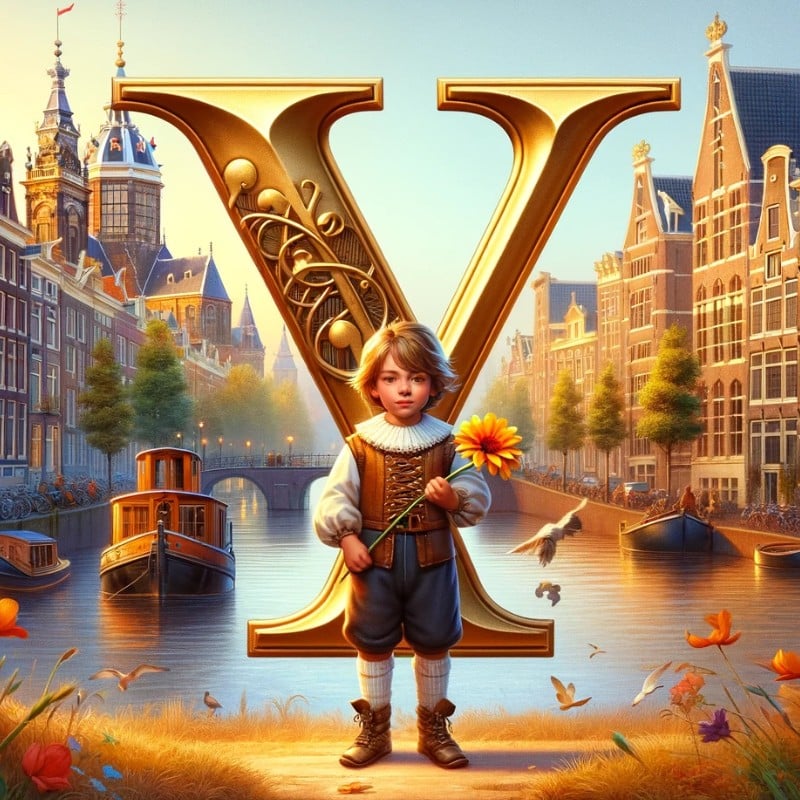
- Yannick: A Breton diminutive of Yann, which is the Breton form of John, meaning “God is gracious.”
- Yann: A Breton form of John, meaning “God is gracious,” used in the Netherlands.
- Yaron: A name of Hebrew origin meaning “to sing,” “to shout,” or “he will sing.”
- Yde: A Frisian name, possibly a short form of Germanic names beginning with “Id,” meaning “work, labor.”
- Yme: A Frisian name of uncertain meaning, possibly related to the name IJme, which has Germanic roots.
- Yorick: A name of Old English and Scandinavian origin, possibly meaning “farmer” or “earth-worker.”
- Ype: A Frisian name, possibly related to the name Ybe, which might be a variant of the name Ebbe or Egbert.
- Yuri: A Russian form of George, meaning “farmer” or “earth-worker,” used in the Netherlands.
- Yvan: A Slavic variant of Ivan, which is the Russian form of John, meaning “God is gracious.”
- Yves: A French name of Germanic origin, from Yvo, meaning “yew.”
- Yvo: A name of Germanic origin meaning “yew (tree).”
Z
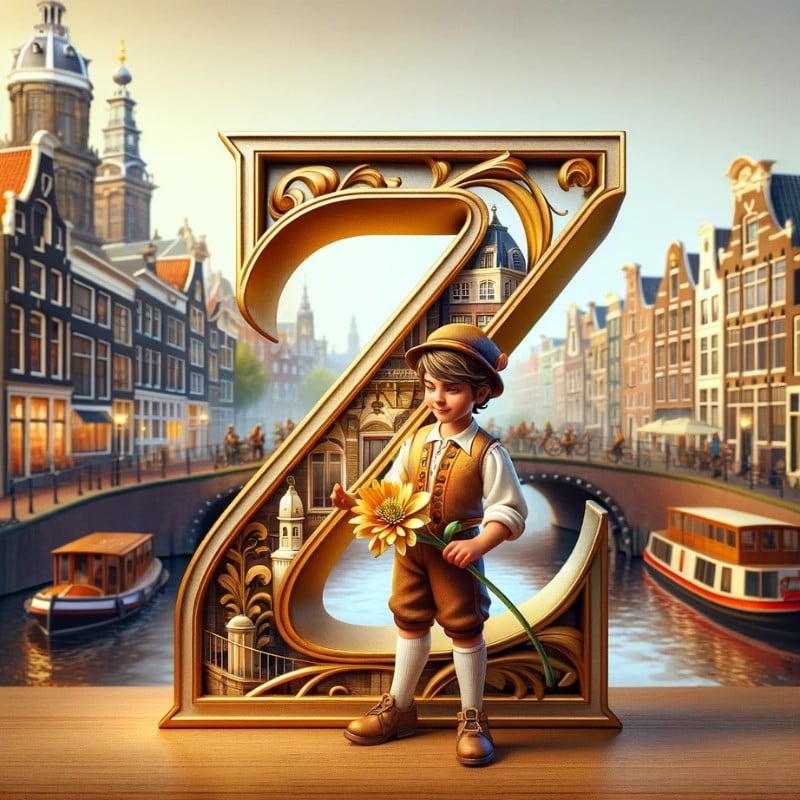
- Zacharias: The Dutch form of Zachariah, meaning “the Lord has remembered.”
- Zeger: A Dutch name meaning “victory bearer.”
- Zenon: Of Greek origin, derived from Zeus, meaning “gift of Zeus,” used occasionally in the Netherlands.
- Zeno: A variant of Zenon, with the same meaning, also used in Dutch-speaking regions.
- Zeph: A short form of Zephaniah, meaning “hidden by God,” used in the Netherlands.
- Ziggy: A diminutive of Sigmund or Siegfried, meaning “victorious protection,” adopted in Dutch-speaking areas.
- Zoran: Of Slavic origin, meaning “dawn” or “daybreak,” used in the Netherlands.
- Zeno: A name of Greek origin, meaning “gift of Zeus,” sometimes found in Dutch-speaking regions.
- Zeger: A Dutch name that may derive from the Germanic elements “sigu” (victory) and “heri” (army).
- Zoltan: Of Hungarian origin, meaning “sultan,” occasionally used in the Netherlands.
